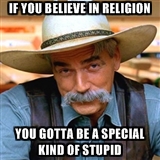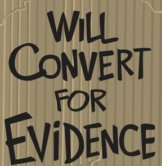
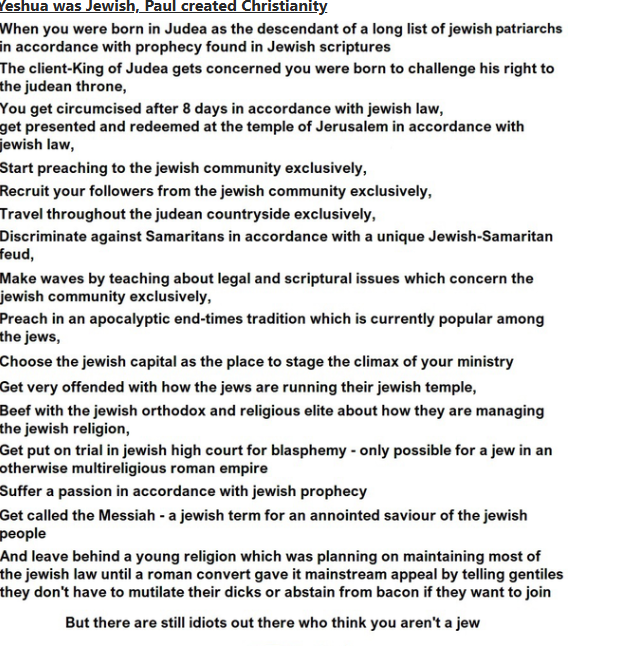
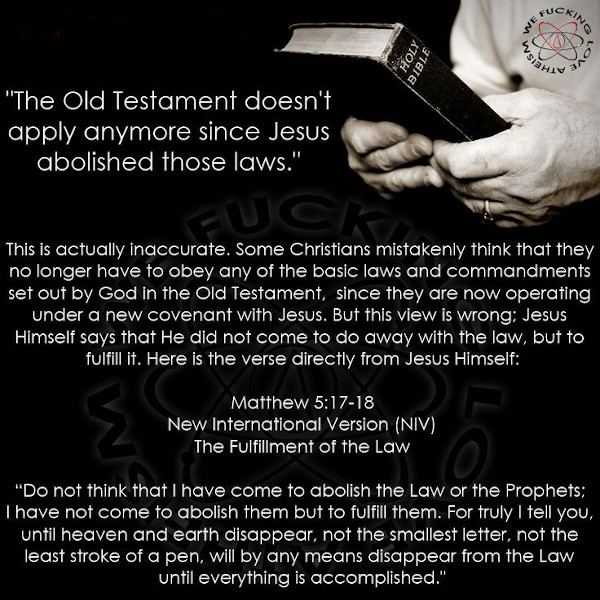
|
My personal thoughts on Jesus
was that he was a mythical character since
his father, Yahweh was also a mythical character.
Show me evidence of Jesus or Yahweh outside the bible.
A mythical character with greater influence in society than the Road Runner and Wiley Coyote, The following is another person's opinion.
I am beyond sick of people who think they can just chuck out the Old Testament. They claim Jesus got rid of the old laws... I'm sorry, where the fuck does it fucking say that anywhere whatsoever? It says the exact opposite. "Not a jot or tittle is changed until heaven and earth disappear." That means the old law will never change and is still valid. Jesus said this. Why the fuck would he say that if he was changing it? What, so God was wrong in the Old Testament? How the shit can God be wrong? The Old Testament doesn't align with their fantasy of a hippie Jesus, so the only thing they can do is pretend it doesn't matter anymore. Which brings me to my next point, hippie Jesus. I'm beyond sick of this hippie Jesus crap. They act like all Christianity is just love thy neighbor, that's it. Wrong as fuck. Jesus was 100% okay with slavery, for one. Oh you think he wasn't? Then why didn't he condemn it? Ephesians 6:5 Why does their precious New Testament say "slaves obey your masters even the cruel ones" If you're going to ignore everything about the bible except what you like, then why do we need the bible at all? Better yet, why do we even need Jesus at all? The only "record" of him existing at all is the bible, so throw that out and why even think Jesus existed in the first fucking place. It's all just so stupid. I'm so tired of these people pretending Christianity is just this lovey dovey nice fun hippie kumbaya thing. If it was, and has been the dominant religion on the planet for millennia, then why the fuck is the world so fucking fucked? Because it is a trash ideology. If you want to believe in hippie dippie love thy neighbor stuff, cool. Christianity is not for you then, it's just called being a good person. Cherry picking the bible for parts you like about hippie Jesus and tossing out the inconvenient parts is so stupid and dishonest. Westboro Baptist are actually some of the "truest" Christians out there, because at least they are in line with the bible. "But they're so vile!" Yeah, exactly, so is the bible. You're so close to getting it. The liberal progressive churches are in such conflict with the bible it's ridiculous. Particularly the Talrico guy. It's like they just make up whatever feels good to them and that's what Christianity is. No. Christianity is the bible. It's all or nothing I'm afraid. I'm just tired of the cognitive dissonance. And tired of the "Jesus's" teachings people. Jesus is nothing. Worthless. A made up character. Captain Jean-Luc Picard of the Starship Enterprise is 100x the role model Jesus is, if we're going off fictional characters. People should be following him if anyone. I'm especially tired of people claiming to be atheists yet going to bat for Jesus and Christianity as if it some wholey good thing that is good for society. It's not. The answer is not to try and get people to be progressive hippie Jesus followers, it's to free peoples' minds and make them realize they don't need any of this bullshit to just be good people, and love their neighbors. It's called being social animals and having a need to cooperate with each other. Look at elephants, do they have an elephant Jesus? No, but they get along just fine. We can be like that too.
|
|
Key Old Testament Passages
Isaiah 53: Describes a suffering servant who takes on the sins of the people.
The Concept of the Messiah
The prophecies suggest that the Messiah would be of the line of
David.
When Jesus died on the cross, He put an end to the Old Testament law
|
He could have explicitly stated that in the Last Supper. He did not.
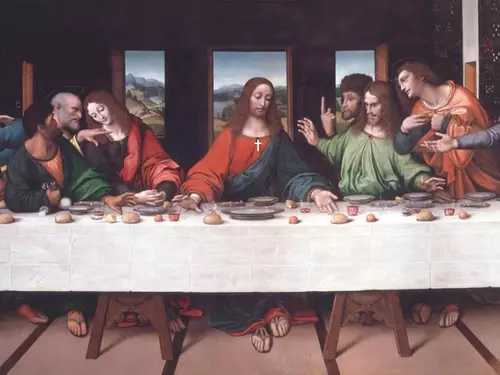
Clear glass was not invented until about 1100 AD in Venice.

|
Christ is the culmination of the law so that there may be righteousness
for everyone who believes.
Romans 10:4 Key Aspects of Romans 10:4:
Fulfillment of the Law: Christ is the culmination or purpose of the Law;
He is the one who perfectly fulfilled its demands and objectives.
Before the coming of this faith, we were held in custody under the law, locked up until the faith that was to come would be revealed. So the law was our guardian until Christ came that we might be justified by faith. Now that this faith has come, we are no longer under a guardian.
So in Christ Jesus you are all children of God through faith, for all of you who
were baptized into Christ have clothed yourselves with Christ. There is neither Jew
nor Gentile, neither slave nor free, nor is there male and female, for you are
all one in Christ Jesus. If you belong to Christ, then you are Abraham's seed,
and heirs according to the promise.
Key Points:
Having abolished in His flesh the enmity, that is, the law of commandments contained
in ordinances, so as to create in Himself one new man from the two, thus making peace,
Having abolished in his flesh the enmity ...
Key Aspects of Ephesians 2:15
|
Once again, Jesus could have explicitly stated that in the Last Supper. He did not.



|
|---|

|
|---|
Send comments to:
 hjw2001@gmail.com
hjw2001@gmail.com
|





